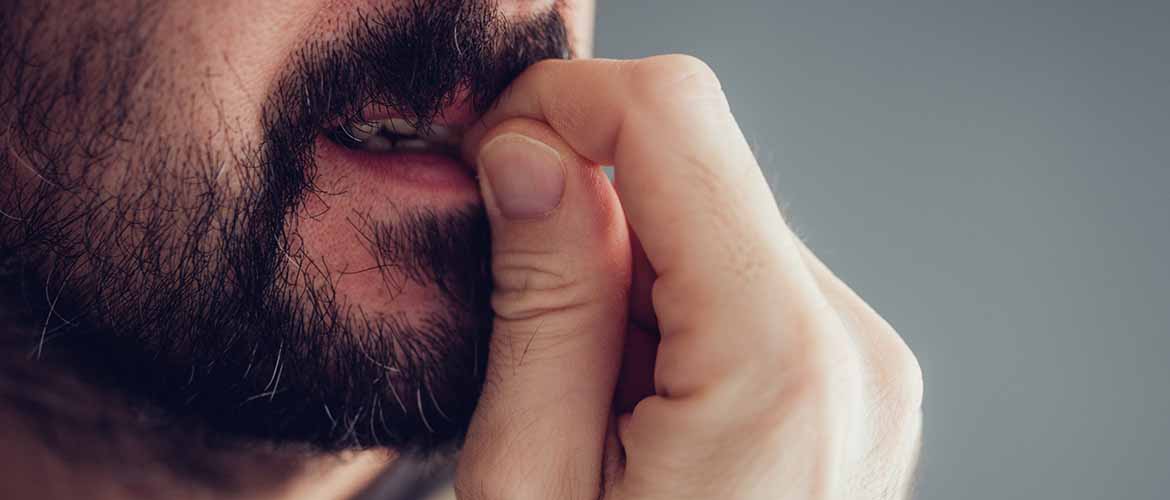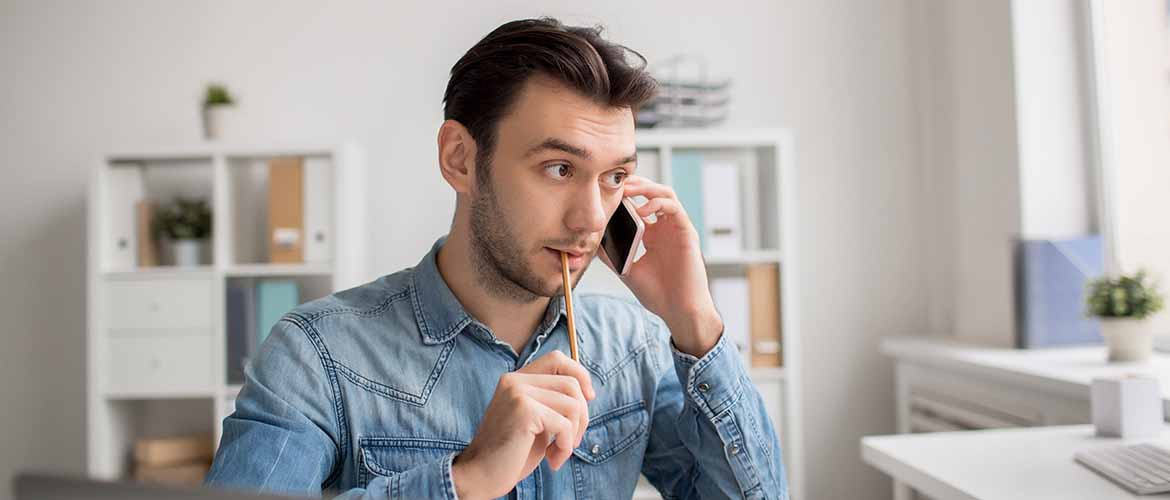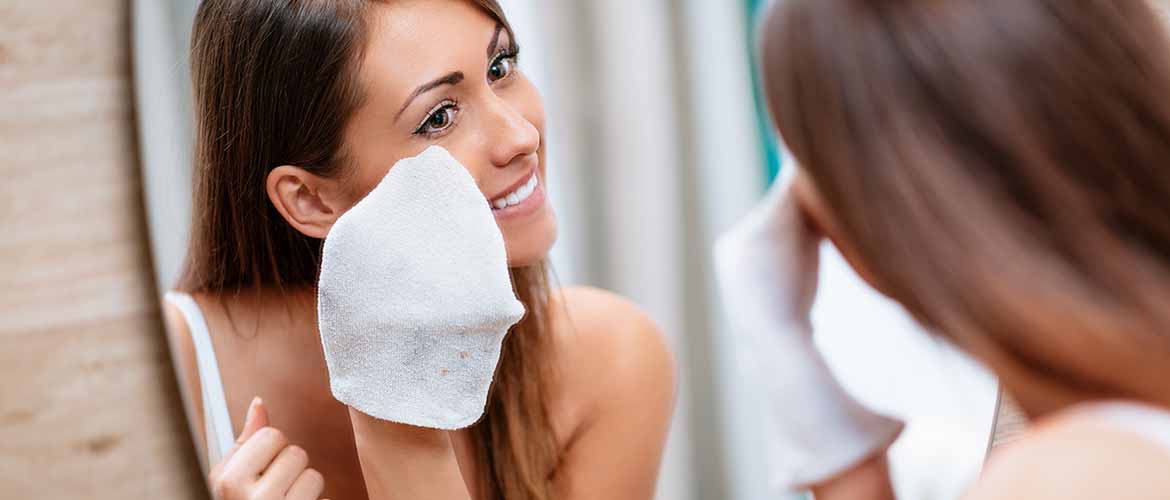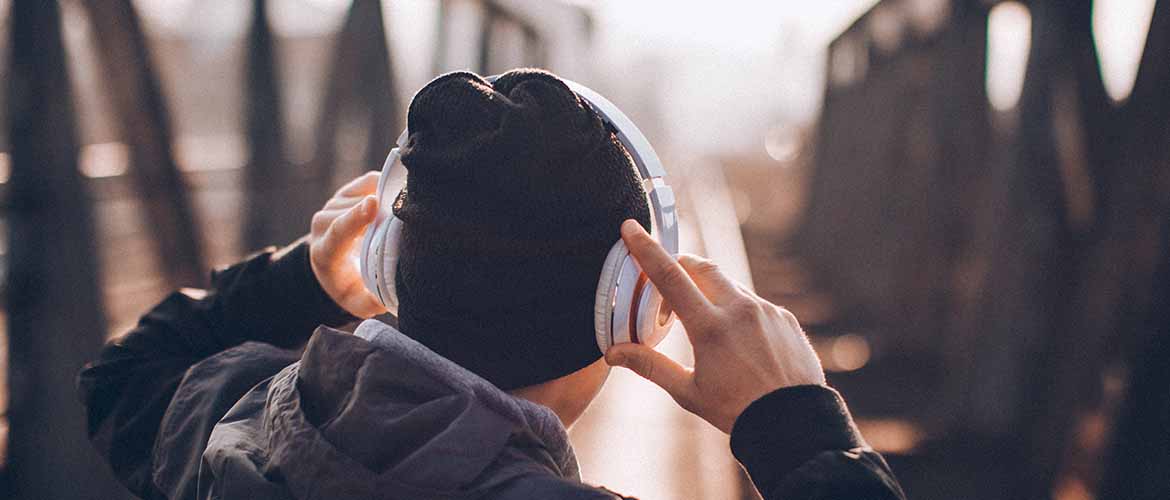February 4, 2019
So what? You've always been a nail biter, especially when you're trying to make that really, really tight deadline at work. It's been like that for as long as you can remember, and nothing bad has happened – yet. It turns out that those little habits that you've never really thought about before – like nail biting and pencil chewing – could be impacting your health in a big way. We have a list of the four biggest, baddest bad-habit culprits – and tips from our very own MedExpress healthcare providers about how you can start to break them.
1. Say No to Nail Biting
If you're a nail biter, find relief in the fact that you're not alone. Nearly 20 to 30 percent of people across all age groups suffer from onychophagia – the very fancy scientific word for habitual nail biting. Researchers are still trying to "nail" down (ha – get it?) the reasons why people habitually gnaw at the tips of their fingers. Many believe it has to do with stress and anxiety. Others think it has more to do with the fact that it's a way to pass the time when you're hungry or bored. And some even believe people do it because it's satisfying and, well, it just feels good!
While the jury's still out on exactly why people bite their nails, we do have a pretty good understanding of why you shouldn't. Think about how many things, places, and people your hands and fingers touch every day. Whether it's your keyboard at work that hasn't been sanitized since, oh, maybe last year, the pump at the gas station that had kind of an icky, gooey substance on it, or even just the faucet in your bathroom, our hands touch dozens of different surfaces each day. And some of these surfaces are pretty darn dirty. The nails (and under the nails) might be some of the biggest collectors of this daily dirt and grime.
So what happens when you bite your nails after touching these surfaces? You're giving bacteria and viruses a direct, non-stop, all-expenses paid trip straight to your mouth. These bacteria and viruses can then return the favor by making their way down to your gut, possibly wreaking havoc on your digestive system and causing unpleasant symptoms like diarrhea and vomiting. In some cases, these bacteria and viruses can cause other illnesses like the dreaded flu, strep throat, and much more. Have we convinced you to stop biting your nails yet?
We asked our own MedExpress healthcare professionals how they've helped their patients tackle nail biting. Below are their suggestions.
Over-the-Counter Assistance
"Some of my patients have had success breaking their nail-biting habit with the help of a special polish sold at many drug stores and pharmacies. The polish goes directly onto your nails and tastes bitter to deter you from chomping down."
- Dr. Dheeraj Taranath, Regional Medical Director
You Know What They Say About Idle Hands
"I always recommend keeping your nails trimmed to avoid temptation. When you get stressed, anxious, bored, or even just hungry, reach for something else to keep your hands busy. Try Silly Putty or Play-Doh. These days, they even make 'therapy dough' that can make your hands smell like lavender. For some of my younger patients, I've recommended fidget spinners – those are still cool, right?"
- Dr. Jeffrey Frye, Area Medical Director
2. Change What You Chew
For many, the pen top or pencil eraser is more than just a part of a writing utensil – it's a snack! Okay, not really – most people don't eat them (we hope). But many chew on them! Like nail biters, pen and pencil chewers do so out of habit. It may seem small and harmless, but pen chewing can do some serious damage to your mouth and also has risky health implications, too.
Not only does chowing down on a pen or a pencil increase your risk for germs that cause illness by giving bacteria and viruses a free trip into the body, it also is an easy way to spread those germs to others, too. When you share your favorite writing utensil with a coworker or friend, for example, you're spreading viruses and bacteria that can live on surfaces for up to seven days.
Plus, this little habit could have big consequences for that beautiful smile of yours. That's right, those pearly whites might be suffering from gnawing on the hard caps of pens. While it's true that your teeth were made for chewing, they were not made for chewing plastic pens and wooden pencils. By nixing this habit, you're potentially saving yourself the pain (literally) of a chipped or cracked tooth.
But don't fret, pen and pencil chewers! MedExpress healthcare providers have some advice to help you quit.
Chew on This
"My best advice for people who chew on their pens and pencils is to try chewing on sugar-free gum instead. Carry a pack of gum around with you and pop a piece into your mouth whenever you start to put a pen to your mouth."
- Dr. Nancie Fitch, Area Medical Director
Start a New Habit
"Sometimes, you might not even realize you're chewing your pen or pencil because it's so mindless. It might seem trivial, but try leaving yourself little reminders on your desk or in your office. Whether you write 'STOP CHEWING' on a Post-It note that hangs on your computer or you put a big sign on your wall that reads, 'PUT THE PEN DOWN,' hanging little reminders up everywhere you look can be a subtle reminder to break the habit."
- Dr. Dena Nader, Regional Medical Director
3. Wake Up Without Makeup
We get it – sometimes you're so exhausted from a long day that you barely have the energy to brush your teeth before slipping under the cozy covers – let alone take off your makeup and give your face a good wash. Us, too! The good news is that one night of sleeping in your makeup likely won't do any long-term damage to your skin. The bad news is that making a habit of sleeping in your makeup can. From your eyes and nose to lips and skin, you're likely going to pay the price over a period of time.
Have you ever had a sty? If not, you're one of the lucky ones. A sty is a red, painful bump near the edge of your eyelid. Sometimes, people mistake them for pimples because they look so similar. But they're painful and, unlike what the name suggests, not so "sty"-lish. A sty is caused by bacteria that builds up around the eyelid, and guess what a main culprit of that buildup is? That's right – makeup. Makeup attracts bacteria, and washing your face and removing your makeup every day can certainly help keep bad bacteria at bay.
Sleeping with old makeup may also cause blepharitis. No, we didn't just sneeze. Blepharitis is the inflammation of the eyelid that makes the eyes appear red and itchy – and that's a big beauty no-no! It's difficult to treat and often occurs when bits and pieces of eye makeup get into the eye and clog the eyelash follicles and glands around the eye. Reduce your risk and remove your makeup before bed.
Need more reasons to wash your face? Breakouts, wrinkles, broken eyelashes, and chapped lips may also be in your future if you're a fan of waking up red-carpet ready.
And while we're talking about before-bed habits, we'd like to issue a reminder to all contact-lens wearers. It's just as important to take out your contacts before bed, too! Leaving in those little lenses can be irritating to the eye and, in some cases, can lead to painful sores, known as corneal ulcers, on the outermost layer of the eye. Corneal ulcers require prompt medical care and, if left untreated, can lead to severe complications, including blindness.
So, how do you break the habit before you break out? One of our providers has a fun tip.
Pamper Yourself
"Make sure makeup removal is part of your bedtime routine. Start the process earlier than normal to allow a little extra time to yourself before hitting the sack. Light a candle, turn on some soothing spa music, take off your makeup, lather up your favorite face wash and lotion, and turn your bathroom into a spa for a few minutes."
- Kristin Youther, Nurse Practitioner
4. Turn Down Your Tuneage
It is so easy to let the volume sneak up on your headphones – especially if you listen to music (or podcasts, TV shows, whatever it is you fancy) while in a louder environment like the bus on your way into work or in the lunchroom during your break. One minute, your volume is at a pleasant and appropriate level 3 – and before you know it, you're jamming to some serious mashups at a level 10. While it may not physically hurt your ears to have your volume up high, it turns out you may be doing some long-term damage to your hearing.
Sounds at or above 85 decibels can damage hearing over time. As a point of reference, a noisy restaurant or heavy traffic, for example, is usually about 85 decibels and can cause hearing problems if you're exposed to it for long periods of time. Fireworks, jackhammers, and certain sirens and drills are too loud to listen to safely at all for any period of time – even lawn mowers and power tools can cause hearing issues. That's why you often see construction and airline workers dawning super-stylish ear plugs or sound-proofing headphones. Before you make fun, though, remember that they're protecting their ears from damaging sounds around them, which is an incredibly important step toward healthy hearing in the future.
What are the risks, you ask? The most obvious issue people face is hearing loss. Itty bitty hair cells within the bones of the inner ear act as little sensors that move up and down to convert sound waves into electrical signals for the brain. In most cases, people may experience hearing loss when these fragile hair cells are damaged or die as a result of loud sounds making them work too hard.
Unfortunately, hearing loss is, in most cases, permanent and can lead to many other issues, too, like social isolation and depression. That's why it's so important to break the bad habit of blasting your tunes sooner rather than later. But how?
Switch It Up
"If you're like me, you've probably had the same pair of headphones for a long time. Old headphones run the risk of having low sound quality, which can require higher volume. Try a pair of headphones that fit over the ears instead of into the ears. Not only does this type of headphone not blast sounds straight into your eardrum, they also may do a better job of eliminating outside noise, allowing you to listen at a lower volume."
- Dr. Reed Erickson, Physician
Give it a Break
"Try not to use headphones for a long period of time. It's best to take a 5-minute break every 30 minutes. Or, pop out those headphones every time there's a commercial on your favorite music station – and as an added bonus, you won't have to listen to those pesky commercials."
- Dr. Emi Chiusano, Area Medical Director
Earplugs? A-Plus!
"That ringing you hear in your ears after a loud concert? It's a sign you might have been too close to the stage or speakers and that your ears may be experiencing temporary – or permanent – hearing loss. We all have tiny hair cells in our inner ear canal that transmit sound to our brain. Loud noise over time can flatten those hair cells and lead to permanent hearing loss, so next time, protect your ears with a pair of earplugs. Trust me, you'll still be able to rock out to your favorite songs and you'll protect your hearing at the same time."
- Jane Trombetta, Registered Nurse
Breaking habits is never easy. But don't underestimate the power of taking small (but mighty) steps to avoid those little, unhealthy habits that could be having a big impact on your health. You might just find yourself feeling, looking, and hearing a lot better!




